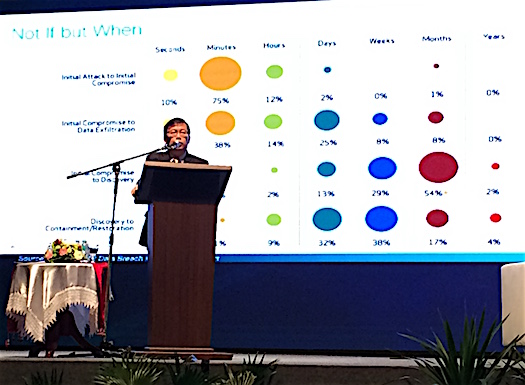How long does it take for a cyber attack to take effect? Minutes.
How long does it take for your data to be stolen? Minutes.
How long does it take to realize you have been compromised? Sometimes months!
Broadcasters must take data security seriously, according to Goh Seow Hiong, Executive Director of Cisco Systems, speaking at the Broadcast Indonesia conference in Jakarta.
With broadcasters using more Internet, E-commerce and Cloud Computing functions, security is now becoming a greater challenge.
“It is not a question of whether you will be attacked, it is a question of when. And if you’re not sure about your security, you probably already have been attacked,” said Seow.
He identified the main issues that can arise from a cyber attack:
- Embarrassment
- Disruption to business operations
- Losses
- Liability
- Data privacy – breach of compliance obligations
- Data sovereignty – theft of your data, loss of control of your data.
New business models and new innovations need data to help identify the new opportunities, but we must protect that data.
Regulators and agencies need to work together to ensure that their systems are protected against attacks, according to Seow. This applies to critical infrastructure such as Power Grids, as well as broadcasting infrastructure.
Many companies and countries have adopted a ‘whack-a-mole’ approach, hitting each problem as it occurs. But the better way is to be proactive by developing a cross industry and government strategy, such as the Australian and Japanese governments have done.
The strategic approach needs all parties to figure out who is responsible and make sure there are no gaps in the strategy. Once the strategy is developed then follow up with laws. But there are also worries about the cost of compliance, so laws must take these business imperatives into account.
Rules and laws can inhibit innovation, but standards, openness and flexibility can enable innovation while still allowing companies to be innovative.
“For western countries privacy is almost a right, but in Asian countries, the concept of privacy is not as strong because of the nature of the society. So there are cross border issues for privacy laws in Asia,” said Seow.
Balancing data protection with growth is important. To facilitate this he suggests the following tips:
- Enable data flow to enable business operations
- Players must know what needs to be done
- Must not be a fragmented approach.
Board level attention is needed to this issue, it cannot be left to the IT Department.
“Install protection and turn it on. You would be surprised at how many companies have protection, but don’t turn it on or use it to the best of its best ability.
“Yes, it does take more effort to manage your security, but you need to make sure you do it so that you become a more difficult target for attackers,” said Seow.
Broadcasters must build the capacity of their organisations by hiring and developing the right people with the right skill sets.
Cisco offers training and scholarships to people to assist in building skills. See the links below.
https://mkto.cisco.com/security-scholarship
In the same session, Reuben Verghese, Managing Director of Diagnal told delegates there are other technical challenges across the region:
Device fragmentation and lack of standards is a problem. “For example, services have to cater for many types of Android device and this creates a lot of challenges for streaming to a variety of different devices and standards.
He was positive about the growth opportunities in Asia, singling out Indonesia and India as significant growth markets. “If you have a good brand and strategy you can get to millions of users in India and Indonesia… There is potential for growth ahead,” he said.

